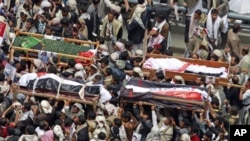Middle East analysts say recent fierce fighting in Yemen may tilt the country toward civil war. The instability increases the risk that a branch of al-Qaida based in Yemen could launch terrorist attacks on foreign soil.
For several months, mostly peaceful protestors, inspired by uprisings in Egypt and Tunisia, have been demanding political and economic change in Yemen.
But in recent days there has been fierce street fighting in the Yemeni capital, Sana’a, with heavy shelling and street battles between the Hashid clan’s tribal militias and pro-government forces.
Edmund J. Hull, a former U.S. Ambassador to Yemen, said, “I think absent some kind of concerted international effort to change the momentum, this is going towards increased violence and quite likely a civil war.”
The fighting began after President Ali Abdullah Saleh refused for a third time to sign a deal to transfer power and eventually step down after more than three decades of authoritarian rule.
Tribal chief Sadiq al-Ahmar has emerged as a prominent challenger of Saleh’s rule. Al-Ahmar leads a powerful tribal organization in an impoverished country where family loyalties are important.
Katherine Zimmerman, an expert on Yemen with the American Enterprise Institute, said, “Saleh’s refusal for the third time to sign a transition deal may have been the last straw for a lot of these groups who say to themselves that perhaps he is not willing to step down peacefully and that the only way to transfer power would be through force.”
American intelligence officials believe al-Qaida in the Arabian Peninsula, based in Yemen, is now the most significant terrorist threat to the United States.
Al-Qaida’s ability to operate in Yemen is expanding, while government efforts against the terrorist group are receding, as troops have been pulled into Sana’a to protect the presidential palace and other infrastructure.
Former Ambassador Hull, author of High Value Target - Countering al-Qaida in Yemen, said that makes the group even more dangerous.
“They have always had an intent to strike not only in Yemen but regionally, in Saudi Arabia, and against the U.S. homeland," he said. "There has been no doubt about that intent. What we are seeing now is an increased capability to act on that intent.”
Analysts say the unrest in Yemen is increasing the operating space for al-Qaida to plan and plot attacks.
Zimmerman said America needs to be on guard. “For the U.S., this puts the country at great risk and it also allows the al-Qaida operatives to operate very freely without as much surveillance.”
While Yemen’s future is unpredictable, analysts say the current turmoil is a boon for al-Qaida, which, they say, is an increasing threat to countries from the Middle East to the United States.




